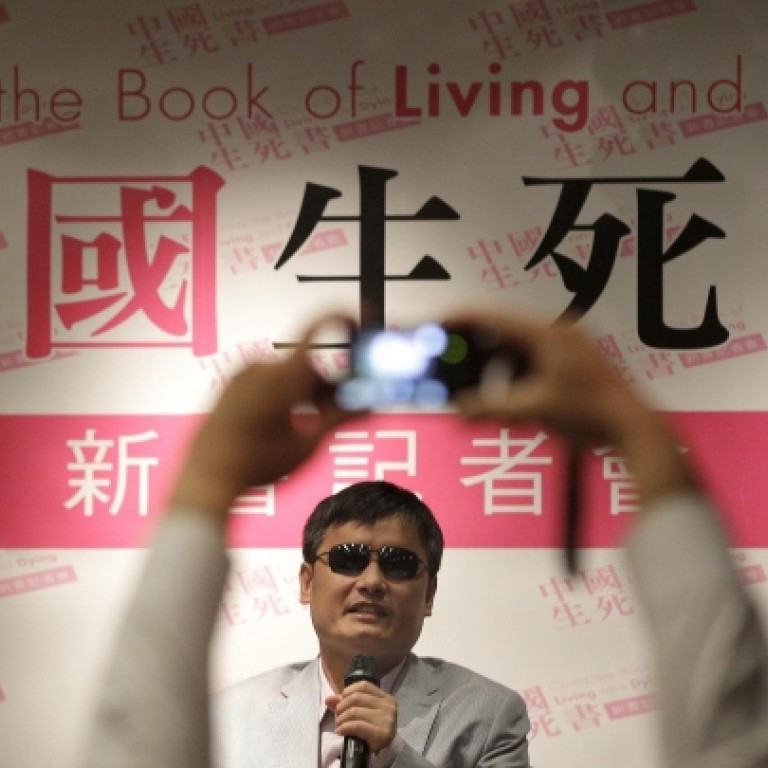
Blind activist Chen Guangcheng faces tough road in redefining himself in US
Chen Guangcheng will face harsh reality of redefining his role in US now that he can no longer be on front line of rights fight in China
A year after stunning the world by escaping house arrest and securing refuge in the American embassy in Beijing, Chen Guangcheng is confronted with a difficult future.
During the past year, the blind legal activist has given speeches and collected human rights awards in Europe and the US, where he eventually ended up after his harrowing flight from his home in rural Shandong .
He still fascinates audiences with his story of exposing forced abortions, and the years of detention and harassment that followed. His two-week visit to Taiwan, where he has advocated democracy on the mainland, has drawn intense media interest.
Despite Chen's public confidence on his future, veteran dissidents and scholars say he faces serious challenges finding a role for himself outside the mainland.
The first signs of this may have come this month, when the legal activist found himself in a public disagreement with New York University, which put him up as a special student since last year.
Chen accused NYU of ending his studies under pressure from Beijing. NYU denied the charge, insisting Chen's stay was always meant to last just one year.
In an interview with the in Taipei last week, Chen declined to discuss his earlier statement on NYU or specify his future plans.
He said he registered his foundation in the US, and he wanted to support activists and help develop China's civil society. "There are many ways of doing human rights work," he said. "I'll do it in my own way - we care about all kinds of human rights abuses."
He said he wanted to collaborate with partners "who have genuine concern about human rights abuses", but remained vague about the details.
New York's Fordham University said it was in negotiations with Chen. The Witherspoon Institute, an American anti-abortion think tank, declined to comment on reports that he has been offered a three-year position. Chen refused to comment on either option.
Some observers raised concerns that Chen has been getting too close to right-wing politicians and risks being used by Washington's anti-China factions.
Before and during his stay in the US, Chen spoke several times at congressional hearings chaired by Republican congressman Chris Smith and both anti-abortion and Christian groups have courted him. But Chen brushed aside such concerns.
"Left or right, as long as they're concerned about human rights, I will collaborate with them," he said. "This does not mean I support everything about them or agree with all their viewpoints. This is very clear.
"I don't want to get involved in the two-party struggle in the US, this is not where my interest lies."
His mentor, NYU law professor Jerome Cohen, said he believed a foundation focused on law reform and human rights would help Chen establish himself as an independent voice.
But he held out hopes for Chen to play a role in China's future. "We hope for a more open and democratic China that will allow him to come back to China and play a role," he said. "He has the makings of a great politician … he has a real political future if there is any opening in China."
But despite Chen's strong character, observers say the road ahead will be tough.
Many political dissidents have experienced long periods of disorientation after escaping overseas, said Su Xiaokang , a writer who fled from China in 1989 after his documentary was accused of helping to incite the Tiananmen pro-democracy movement.
Su, now living in the US, remembered feeling lost in the limelight after receiving a hero's welcome and invitations to speak about Tiananmen.
"It makes you forget who you are and the longer the flattery goes on, the longer this [confusion] lasts," he said. "The danger is you no longer know your own role."
Hu Ping , editor of US-based political magazine , who is familiar with exiled dissidents, said life was often difficult once they were removed from the battleground at home.
"Chen was a heroic figure because of his determination and the risks he had taken, but when the risks don't exist any more, then his moral aura will fade," Hu said.
Chen faces more challenges than other exiles because of his disability, lack of English skills and formal qualifications, observers say.
Professor Perry Link, a Sinologist at the University of California, Riverside, who has aided many Chinese dissidents, said Chen belongs to a group of exiles who find the adjustment the toughest.
Chen was too old to reinvent himself and too young to retire, he said. "The limelight that he now enjoys will fade," Link said. "Judging from others who have similar cases, he has a bleak-looking future."
Given his mission and determination, scholars say the best scenario would be for Chen to return to China and play a role one day, but this seems unlikely.
After Chen escaped, his family were harassed. His nephew was sentenced to three years in jail after accidentally injuring an official who stormed into his house to look for Chen. Chen's older brother was beaten by unidentified thugs last month and has been repeatedly intimidated.
"The authorities want to pressure me into saying less," he said.
But Chen said he would not be intimidated and insisted there will be a day when he can go home freely. "I will return to China for sure," Chen said.

